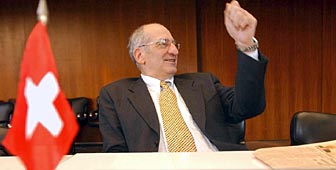EFTA members sign free trade accord with Singapore

The European Free Trade Association has signed an accord with Singapore during a ministerial summit in Iceland.
The trade agreement – which is due to take effect on January 1 2003 – will remove all tariffs governing industrial exports between Singapore and EFTA member states.
The agreement was signed on the first day of a two-day meeting attended by the Swiss economics minister, Pascal Couchepin.
“Trade between EFTA and Singapore last year totalled $3.2 billion. Our agreement…will give it a boost,” said George Yeo, Singapore’s trade and industry minister.
Ministers at the summit also held talks about the future direction of EFTA’s relations with non-EU countries.
Founded over 40 years ago to boost trade between European nations but now dwarfed by the European Union, EFTA is today comprised of just four nations – Switzerland, Liechtenstein, Iceland and Norway – and accounts for only 2.5 per cent of global trade.
But Gregor Kundig, a board member at the Swiss Business Federation, says the association’s small size does not mean it has no role to play on the global economic stage.
“It may be a hang-over from a previous era…but I would underline that it’s a small and efficient unit that still serves important needs,” Kundig told swissinfo.
International relations
Over the past decade, the association – which has its headquarters in the Swiss city of Geneva as well as offices in Brussels and Luxembourg – has sought to widen its network of international relations.
“As the number of nations belonging to the World Trade Organization increases,” said the Swiss secretary-general of EFTA, William Rossier, “it is becoming more difficult to conclude [trade agreements].”
Rossier added that EFTA gives Switzerland – which contributes SFr9.3 million to the association every year – the opportunity to speed up the process of signing commercial accords with expanding markets.
Kundig says critics of the free trade association – who wonder what common interests Switzerland shares with Iceland or Norway – miss the point.
“They are also highly advanced industrial nations, particularly Norway, so all-in-all we have similar interests. For instance, we have within EFTA established the free movement of people, as exists within the EU,” he said.
Trade agreements
In the 1990s, EFTA concluded a total of 16 free trade agreements with countries in eastern Europe and the Mediterranean area. The move was partly sparked by fears that accords struck with these countries by the EU threatened to discriminate against businesses in EFTA states.
In 1995, EFTA decided to widen the geographical scope of its efforts beyond the confines of Europe.
A free trade agreement with Mexico and a declaration on trade and investment co-operation with the South American free trade association, Mercosur, both signed in 2000, extended EFTA’s network across the Atlantic.
swissinfo with agencies

In compliance with the JTI standards
More: SWI swissinfo.ch certified by the Journalism Trust Initiative
You can find an overview of ongoing debates with our journalists here. Please join us!
If you want to start a conversation about a topic raised in this article or want to report factual errors, email us at english@swissinfo.ch.